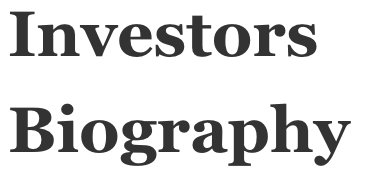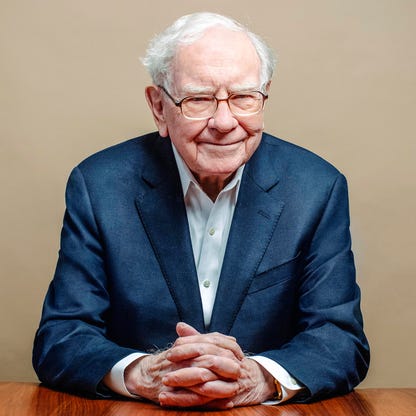Warren Buffett built on the business skills he displayed as a young man to become one of the most successful investors in history. His firm, Berkshire Hathaway, has pursued an investment strategy that, while often running contrary to market trends, has proven highly lucrative. He has a net worth of more than $100 billion and has donated more than $49 billion to charity.
Early Life
Warren Edward Buffett was born on August 30, 1930, in Omaha, Nebraska. He is the second of three children born to US congressman Howard Homan Buffett and Leila Stahl Buffett.
Buffett’s father ran a stock brokerage in addition to being a Congressman, and as a boy his son would often visit the business. Buffett made his first investment at the age of 11. He later sold his three shares of Citi Services Preferred when the stock price rose by $2. The company’s stock price subsequently quadrupled, teaching Buffett a valuable lesson about the importance of patience in investing.
By his teenage years, Buffett was delivering newspapers as well as publishing and selling a horseracing tip sheet. In high school, he expanded his entrepreneurial interests when he started and ran a business that leased pinball machines to local merchants. By the end of his undergraduate studies, he had saved $10,000 in earnings from his businesses.
Education
Buffett matriculated college at the age of 16, studying business at the University of Pennsylvania. He transferred to and finished his degree at the University of Nebraska, from which he graduated when he was only 20. Buffett earned his master’s degree the following year from the Columbia University School of Business. It was there he studied under economist Benjamin Graham, whose “value investing” approach has influenced Buffett throughout his career.
As its names implies, “value investing” involves identifying companies that are undervalued based on their stock price. The approach is akin to a bargain hunter, with an investor needing to conduct a deep analysis to determine a company’s potential profitability.
Berkshire Hathaway
After completing his formal education, which also included studies at the New York Institute of Finance, Buffett began selling securities. He then joined Graham’s company as an analyst, a position he held for two years. Buffett subsequently moved back to Omaha, where he established Buffett Partnership Ltd in 1956. Through this firm, he drew on the investment lessons taught to him by Graham. The approach worked, and Buffett soon became a millionaire.
By the early 1960s, Buffett’s investments included stock in the textile manufacturer Berkshire Hathaway. Buffett went on to increase his stock holdings in Berkshire Hathaway and, by 1965, had taken majority control of the company. He shut down Buffett Partnership in 1969, choosing instead to focus on building his investment portfolio through Berkshire Hathaway. Buffett would go on to transition the company away from textile manufacturing and toward myriad investments in high-value companies.
The Oracle of Omaha
Over the years, Buffett’s investments through Berkshire Hathaway have included companies across various industries, from media to insurance and from consumer products to banking. He has also proven to be a capable leader. When one of his investments, the investment bank Salomon Brothers, was riven by scandal in the early 90s, Buffett stepped in to lead the firm, eventually making his investment profitable.
Buffett’s prescience has earned him the moniker the “Oracle of Omaha” and led other investors to put their money into Berkshire Hathaway. From the 60s to the 90s, Berkshire Hathaway’s publicly traded shares rose annually by 28 percent, a rate of growth that was more than 2.5 times that of the major stock averages.
During the subprime mortgage crisis and subsequent recession of the aughts, Buffett again lived up to his nickname when he made billion-dollar investments in Goldman Sachs and General Electric. Many doubted Buffett’s judgment, but the deals ultimately proved to be lucrative. In 2009, he purchased the railroad company Burlington Northern Santa Fe Corporation and, along with a private equity group, bought food and beverage company H. J. Heinz in 2013.
Today, through Berkshire Hathaway, Buffett maintains investments in dozens of companies, including Apple and Coca-Cola. He also has majority stakes in Duracell, Dairy Queen, and Geico.
Personal Life and Philanthropy
Unlike some of his fellow billionaires, Buffett has chosen to live a relatively modest lifestyle. He has resided in the same house in his native Omaha since 1958 and eats an inexpensive McDonalds breakfast each morning.
In 2006, Buffett announced that he would be donating 85 percent of his fortune to charity, with much of it going to the Bill and Melinda Gates Foundation. A longtime friend of Bill Gates, he later collaborated with the Microsoft cofounder and his wife, Melinda, to establish the Giving Pledge, which asks ultra-wealthy individuals to commit to giving away most of their fortunes during their lifetimes. Starting with 40 signatories in 2010, the Giving Pledge has since attracted hundreds of pledgees from around the world.
In recognition of his philanthropy, Buffett received the Presidential Medal of Freedom in 2011. In 2020, he increased his promised giving, announcing that he would donate more than 99 percent of his wealth to charity.

